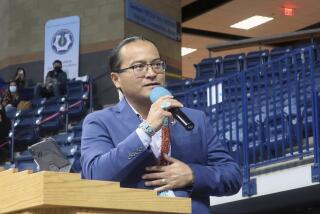Lawmakers Clash Over Honoring of Japanese American Internees
Two Ventura County Republican legislators clashed Friday over a resolution declaring Feb. 19 as a day of remembrance of Japanese Americans sent to relocation centers during World War II.
On one side was Oxnard Assemblyman Nao Takasugi, the first Asian American elected to the state Legislature, and a former internee at the Gila River Relocation Center in Arizona.
Takasugi, who coauthored the resolution, said honoring American citizens sent to live behind barbed wire fences because of their Japanese ancestry would go a long way to heal “a black page in American history.”
But his Assembly colleague Brooks Firestone, who calls himself a student of World War II because of the many books he has read on the subject, argued the measure would only help to minimize Japan’s role in the war.
“There is a revisionist movement in Japan to reduce their blame in the war, if not eliminate it, and to give America some of the blame,” said Firestone, whose district includes portions of western Ventura County.
Firestone abstained from voting on the resolution, which eventually passed 70 to 0 before being sent to the Senate, where it was approved without discussion.
The purpose of the resolution, Takasugi said, was to bring to the public’s attention that on Feb. 19, 1942, President Franklin Delano Roosevelt signed an executive order stripping away the civil rights of more than 120,000 American citizens and legal residents.
Takasugi said Roosevelt’s action came despite the fact that Japanese Americans fought in the war, pointing out that a cousin of his was killed in action.
“The reason I am so moved to have this declared a day of remembrance is my cousin, Leonard Takasugi, the eldest of a family of nine boys and two girls, and his younger brothers George, John and Knox, were in the European theater in the same front line. It was Leonard who made the supreme sacrifice,” Takasugi said.
The former Oxnard mayor said he was a 19-year-old full of idealism when his family was forced to live in the Arizona camp.
“Being interned and having all of my civil rights taken away from me overnight was a dashing of my hopes and ideals as a young junior student at UCLA. It was almost unbelievable to me. I questioned why was this happening to me, to us,” Takasugi said.
Firestone said he does not doubt that Takasugi and others were treated in a terrible fashion. But he said he is afraid America’s losses at the hand of Japan will be forgotten.
“It was terrible what happened to them. It was a reprehensible incident,” Firestone said. “But I feel when we memorialize this incident, we need to put it into perspective of the greater sacrifice and greatness of America during the second world war.”
“We did not start the war. Japan, Italy and Germany started the war,” Firestone said.
Republican Assemblyman Tom McClintock, who represents Simi Valley, Thousand Oaks and Oak Park, signed on as coauthor of the resolution and voted for its passage.
“As the author, Mike Honda, said, this resolution’s importance is to heal wounds, very deep wounds, that were inflicted on loyal American citizens in the panic that followed Pearl Harbor,” McClintock said.
McClintock disagreed with Firestone trying to send a broader message about Japan’s role in the Pacific conflict.
“Japan’s involvement has nothing to do with loyal American citizens who happen to be of Japanese ancestry,” he said.
More to Read
Get the L.A. Times Politics newsletter
Deeply reported insights into legislation, politics and policy from Sacramento, Washington and beyond. In your inbox three times per week.
You may occasionally receive promotional content from the Los Angeles Times.






